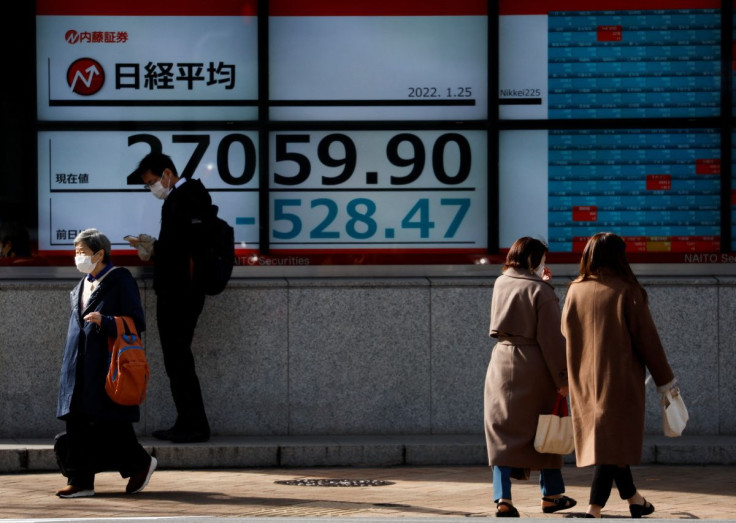Equities Sell Off And U.S. Dollar Gains On Escalating Russia/ Ukraine Fears

Investors around the world lost their appetite for risk on Wednesday with stocks selling off and the U.S. dollar gaining ground as Ukraine declared a state of emergency amid intensifying fears of a full-scale Russian invasion.
Trading in both riskier and safe-haven assets has been volatile since Russian President Vladimir Putin's dispatch of troops earlier this week into parts of Ukraine, which in turn triggered sanctions from Western countries and the threat of more to come if Moscow advances further.
Oil futures, which whipsawed during the session between supply concerns and uncertainty, settled well below their session highs. U.S. Treasury yields, while staying above Tuesday's close, were also volatile.
Ukraine declared a state of emergency and told its citizens to flee Russia, while Moscow began evacuating its Kyiv embassy. Shelling intensified in eastern Ukraine, where Putin recognised the independence of two separatist Moscow-backed regions and deployed troops as "peacekeepers".
A senior U.S. official said on Wednesday that Russia is as ready as it can be to launch what could be a full-scale invasion, with 80 percent of troops assembled around Ukraine in attack positions.
After rising as much as 0.7% earlier on Wednesday the MSCI World Index, a leading gauge of equity markets globally, reversed course in morning trading was last down 1% with losses deepening in afternoon trading. After falling as much as 1% and rising almost 2%, Brent crude settled unchanged from Tuesday's close at $96.84, while West Texas Intermediate settled up 0.21% at $92.10 per barrel after earlier falling as much as 1.9% and rising 1.7% all in the same day. [O/R]
While investors have also been grappling with the prospects of a U.S. Federal Reserve policy tightening in the face of surging inflation, these worries have "been somewhat superseded by events in eastern Europe and in Russia," said Rhys Williams, chief strategist at Spouting Rock Asset Management.
"So in the very short term, markets will go up or down based on whether (Putin) marches to Kyiv," said Williams, adding that investors had appeared to accept that Russia had moved into the Donetsk and Luhansk regions in Ukraine.
But if Putin "goes to Kyiv and there is a regime change and potentially a guerrilla war for the next two generations, that's a more difficult scenario and there is frankly only one person who can decide this."
Treasury yields were higher as investors monitored Russia-Ukraine events and remained concerned about inflation and a potential Federal Reserve policy mistake.
Benchmark 10-year notes last fell 9/32 in price to yield 1.979%, from 1.948% late on Tuesday. The 30-year bond last fell 18/32 in price to yield 2.2782%, from 2.253%. The 2-year note last fell 1/32 in price to yield 1.5976%, from 1.587%.
Trading was also choppy in currencies with the dollar index last up 0.132% and the euro down 0.18% to $1.1305.
The Japanese yen strengthened 0.08% versus the greenback at 114.96 per dollar, while Britain's pound was last trading at $1.3538, down 0.32%.
The Dow Jones Industrial Average fell 373.58 points, or 1.11%, to 33,223.03; the S&P 500 lost 62.83 points, or 1.46%, to 4,241.93; and the Nasdaq Composite dropped 266.53 points, or 1.99%, to 13,114.99.
After rising as much as 1.17% earlier in the day the pan-European STOXX Europe 600 index closed down 0.28%.
Gold added 0.5% to $1,907.18 an ounce.
© Copyright Thomson Reuters {{Year}}. All rights reserved.




















